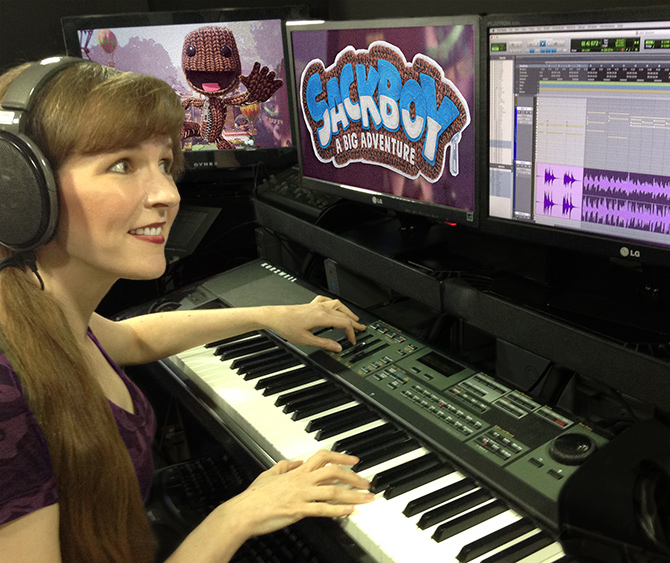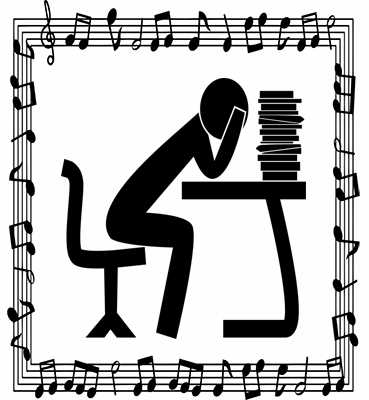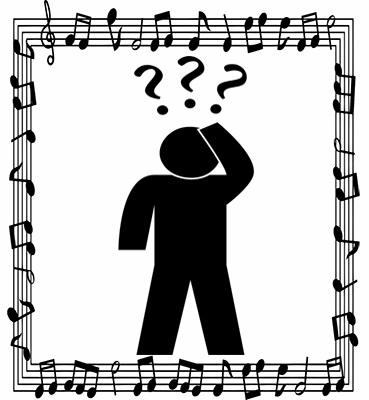
By Winifred Phillips | Contact | Follow
Delighted you're here! I'm video game composer Winifred Phillips, and this past year has been particularly busy for me. I've released several projects this year, including Sackboy: A Big Adventure (my latest, pictured above) – and I'm very pleased that my Waltz of the Bubbles composition from Sackboy: A Big Adventure just won a Global Music Award, and is nominated along with the rest of the game's soundtrack in this year's NAVGTR Awards! In between projects, I've given three virtual talks this past year at the Game Developers Conference in March, the VGM Academy Live event in April, and the GDC Summer event in August. Popular events like these are great opportunities to touch base with the community and exchange ideas about the art of game composition and the business of being a video game composer.
All during this time, I've been keeping up with this blog, writing monthly articles that explore different topics of interest to us as game composers. In addition to the regular monthly entries, every year I write an article that tries to answer the question, "how does an aspiring composer break into the video game industry?" This is the question I'm personally asked most often, and it's one I always struggle to answer.
Part of the reason for this is that my own "breaking into the business" story is so unusual. My first video game project happened to be a triple-A blockbuster (God of War from Sony Interactive),  and I was able to land the gig because an example of my work landed on the desk of a music supervisor for the project at exactly the right time. What are the chances of that? It's akin to being struck by lightning, and I certainly can't advise young composers to depend on that kind of lightning to strike. But I don't want to leave hopeful young composers in the lurch either.
and I was able to land the gig because an example of my work landed on the desk of a music supervisor for the project at exactly the right time. What are the chances of that? It's akin to being struck by lightning, and I certainly can't advise young composers to depend on that kind of lightning to strike. But I don't want to leave hopeful young composers in the lurch either.
So every year, I revisit the subject, trying to learn what helpful advice might be offered by virtue of the common wisdom that exists at the time. In expert articles and community posts, the subject is ceaselessly examined and reconsidered. It's an evolving conversation that shifts in subtle but appreciable ways from year to year. So this is the 2021 edition, in which I share the interesting observations I've gathered from online sources during the previous year. Hopefully, this article will provide some guidance and support for those who are embarking on their own game music careers. But first, in case anyone might like to hear a fuller retelling of my own "breaking into the business" story, here's an interview I gave in 2011 with GameSpot in which I recount how I landed my first gig. The relevant discussion begins at 4 minutes and 15 seconds:
So now, let's start exploring some of the advice and observations that have been shared across our game music community during the past year. In these articles and online conversations, I've noticed a few common threads that I'll try to tie together. These include some objectives and goals that we need to obtain in order to succeed – some things that we have to get. So I've arranged this article accordingly, under these headings:
Getting the education
Getting the reputation
Getting the contacts
Getting the chance
Getting fired up
So let's start with the first item on the list:
Getting the education
 When embarking on any career, education is always a pressing concern from the outset. However, this seems to be a pretty controversial subject in regards to the career path of an aspiring composer. Especially this year, I've noticed a lot of ambivalence and differing points of view on the subject of formal education for game composers.
When embarking on any career, education is always a pressing concern from the outset. However, this seems to be a pretty controversial subject in regards to the career path of an aspiring composer. Especially this year, I've noticed a lot of ambivalence and differing points of view on the subject of formal education for game composers.
Of course, any educational institution will be happy to endorse the higher-education path for game composers. "Formal education and experience are keys to success here," asserts the Berklee Online TakeNote blog. "Being a great composer means understanding the technicalities and mechanics of music on multiple levels."
As one might expect, that sentiment is echoed by many other educational institutions. "A fantastic way to separate yourself from thousands and thousands of self-taught musicians and producers is by earning a reputable music degree," claims the blog of the Atlanta Institute of Music & Media. "This will also increase your chances for higher pay when you land yourself a career in music."
This idea seems to be supported (at least in part) by the latest edition of the Game Audio Industry Survey, which gathers information about the state of the industry on a fairly regular basis. Out of every ten respondents to the latest edition of the Game Audio Industry Survey, eight reported having bachelor's degrees or higher. However, this information only pertained to salaried game audio team members. It is worth noting that out of those degree-earning game audio pros, three-quarters of them had obtained music degrees. The survey also reports that "one in 3 audio employees at game companies compose music, most of whom also perform other duties."
 This would seem to suggest that aspiring game composers would be well served by pursuing a degree in music. On the other hand, the Game Industry Career Guide begs to differ. Lumping composers and sound designers together under the term "audio engineer," Jason Bay of the Game Industry Career Guide asserts that "most of the Audio Engineers that I’ve met are self-taught, although there are audio engineering schools that you can attend to get targeted training."
This would seem to suggest that aspiring game composers would be well served by pursuing a degree in music. On the other hand, the Game Industry Career Guide begs to differ. Lumping composers and sound designers together under the term "audio engineer," Jason Bay of the Game Industry Career Guide asserts that "most of the Audio Engineers that I’ve met are self-taught, although there are audio engineering schools that you can attend to get targeted training."
Delving into discussions amongst the mostly-anonymous online community yields somewhat different results, as the attitudes about formal education become much more circumspect. In a Reddit thread about pursuing a career in game music composition, user FizzleFry186 observes that "people go to music school for the prestige and the alumni network, as well as the education. You don't necessarily need it, but it definitely helps you get gigs and put a little more weight behind your name."
This non-committal attitude was echoed throughout the Reddit thread. "Go to school for something tangentially related - coding or whatever - and then do a music minor that focuses on comp or  performance or whatever hole you have in your education," advises Reddit user Ragfell. "You’ll be better for both experiences."
performance or whatever hole you have in your education," advises Reddit user Ragfell. "You’ll be better for both experiences."
As a counter to this argument, Reddit user Dogsarefun argues that "there’s a reason that almost all professional artists, graphic designers, illustrators etc have some kind of formal training. And that’s because it’s really hard to get to that level of work without the guidance of professionals in that industry, without the critique process and without the environment to grow."
As in previous years, it seems that this subject remains controversial. Nevertheless, there does seem to be a consensus now that higher education affords an aspiring game composer with a respectability and authenticity that we'll hereafter label as "professional stature." This leads us directly to our next goal as aspiring game composers:
Getting the reputation
How do we obtain that elusive "professional stature" if we haven't yet landed our first gig? What can we do to create a reputation for quality and reliability, if we haven't had the chance to demonstrate those qualities on-the-job?
For a long time, the consensus answer to this question centered on a composer's demo reel – their portfolio of sample recordings that represented the aspiring composer's "best foot forward." However, within the past year, the common wisdom seems to be moving gradually away from this demo-centric approach.
 Certainly, demo reels aren't going away, and are still considered important by many. One article I read this year was particularly eye-opening in terms of how indie-developers think about the music needs of their games. In an article posted in a blog maintained by the Xsolla company, freelance sound designer Taj Wheeler stresses that "you should consider whether the composer is capable of creating fitting compositions." The article stresses that developers need to be careful when working with composers. "You won’t know how the music will sound until they send you demos or a final track... Before you begin, evaluate if your game needs a composer, if it’s the right time to approach one, how to choose one, and how to work with them." This article is particularly interesting for composers attempting to understand why young developers may be extra cautious when hiring composers. In these circumstances, it would seem that demo reels take on heightened importance.
Certainly, demo reels aren't going away, and are still considered important by many. One article I read this year was particularly eye-opening in terms of how indie-developers think about the music needs of their games. In an article posted in a blog maintained by the Xsolla company, freelance sound designer Taj Wheeler stresses that "you should consider whether the composer is capable of creating fitting compositions." The article stresses that developers need to be careful when working with composers. "You won’t know how the music will sound until they send you demos or a final track... Before you begin, evaluate if your game needs a composer, if it’s the right time to approach one, how to choose one, and how to work with them." This article is particularly interesting for composers attempting to understand why young developers may be extra cautious when hiring composers. In these circumstances, it would seem that demo reels take on heightened importance.
This attitude toward the importance of composer portfolios doesn't radically change as the game developers become more established, either. "The best thing to do if they don’t have any experience at all is to put together a reel," advises Brandon Young (director of music affairs at Activision Blizzard).  "Pull images off YouTube, do your own spec score to it. Especially if it’s things I want to be seeing, like a clip of Call of Duty: Mute it, do your own score to it, see how that comes across. If you’re trying to convey a few different styles, a minute and a half, two minutes each."
"Pull images off YouTube, do your own spec score to it. Especially if it’s things I want to be seeing, like a clip of Call of Duty: Mute it, do your own score to it, see how that comes across. If you’re trying to convey a few different styles, a minute and a half, two minutes each."
Brandon Young also offers a warning about the size of demos and the manner in which they might be submitted. "There’s only so much I can, or want to download," he says. "If they email me a 20Mb file that jams my inbox, it discredits them and I’m going to delete the attachment."
That sentiment has also filtered into community Reddit threads on the subject, particularly when considering the value of a formal education. "Everyone tells you that the degree doesn’t matter, it’s your work, your portfolio," asserts Reddit user Dogsarefun.
However, for every mention of demo reels and portfolios, there are also assertions that the current industry no longer places as much importance on these items as they once did.  "Your website is more likely to get attention than your demo reel, and nobody can throw your website into the trash." asserts the Connolly Music blog.
"Your website is more likely to get attention than your demo reel, and nobody can throw your website into the trash." asserts the Connolly Music blog.
This focus on web building/marketing skills is affirmed in the Reddit


































